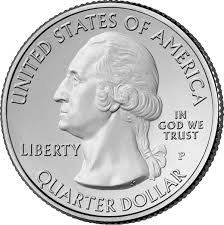quarter
英 [ˈkwɔː.tər]
美 [ˈkwɔːr.t̬ɚ]
- n. 四分之一;地区;季度;一刻钟;两角五分;节
- vi. 住宿;驻扎
- vt. 将…四等分;供某人住宿
- num. 四分之一
使用频率:

中文词源
quarter 四分之一,一刻钟,季度,营房,住宿区
来自拉丁语quartus,四分之一,词源同four,quadrille.引申词义季度,刻钟。后用于指城区的部分,营房,住宿区等。
英语词源
- quarter
-
quarter: [13] Quarter is one of a large family of English words that go back ultimately to Latin quattuor ‘four’ and its relatives. Direct descendants of quattuor itself are actually fairly few – among them quatrain [16] and quatrefoil [15] (both via Old French). But its ordinal form quārtus ‘fourth’ has been most prolific: English is indebted to it for quart [14], quarter (via the Latin derivative quartārius ‘fourth part’), quartet [18], and quarto [16].
In compounds quattuor assumed the form quadr-, which has given English quadrangle [15] (and its abbreviation quad [19]), quadrant [14], quadratic [17], quadrille [18], quadruped [17], quadruplet [18] (also abbreviated to quad [19]), quarantine, quarrel ‘arrow’, not to mention the more heavily disguised cadre [19], carfax [14] (which means etymologically ‘four-forked’), squad, and square.
And the derivative quater ‘four times’ has contributed carillon [18] (etymologically a peal of ‘four’ bells), quaternary [15], and quire of paper [15] (etymologically a set of ‘four’ sheets of paper).
=> cadre, carfax, carillon, quad, quarrel, quarry, quire, squad, square - quarter (n.)
- c. 1300, "one-fourth of anything; one of four parts or divisions of a thing;" often in reference to the four parts into which a slaughtered animal is cut, from Old French quartier, cartier (12c.), from Latin quartarius "fourth part," from quartus "fourth" (see quart). One of the earliest dated references in English is to "parts of the body as dismembered during execution" (c. 1300).
Used of the phases of the moon from early 15c. The use of quarter of an hour is attested from mid-15c. In Middle English quarter also meant "one of the four divisions of a 12-hour night" (late 14c.), and the quarter of the night meant "nine o'clock p.m." (early 14c.).
From late 14c. as "one of the four quadrants of the heavens;" hence, from the notion of the winds, "a side, a direction" (c. 1400). In heraldry from mid-14c. as "one of the four divisions of a shield or coat of arms." The word's connection with "four" loosened in Middle English and by 15c. expressions such as six-quartered for "six-sided" are found. Meaning "region, locality, area, place" is from c. 1400. Meaning "portion of a town" (identified by the class or race of people who live there) is first attested 1520s. For military sense, see quarters. As a period of time in a football game, from 1911. Quarter horse, bred strong for racing on quarter-mile tracks, first recorded 1834.
The coin (one fourth of a dollar) is peculiar to U.S., first recorded 1783. But quarter could mean "a farthing" in Middle English (late 14c.), and compare British quadrant "a farthing" (c. 1600), and classical Latin quadrans, the name of a coin worth a quarter of an as (the basic unit of Roman currency).
Quarter days (mid-15c.), designated as days when rents were paid and contracts and leases began or expired, were, in England, Lady day (March 25), Midsummer day (June 24), Michaelmas day (Sept. 29), and Christmas day (Dec. 25); in Scotland, keeping closer to the pagan Celtic calendar, they were Candlemas (Feb. 2), Whitsunday (May 15), Lammas (Aug. 1), and Martinmas (Nov. 11). Quarter in the sense "period of three months; one of the four divisions of a year" is recorded from late 14c. - quarter (v.)
- "to cut in quarters, divide into four parts," mid-14c., from quarter (n.). Specifically as the word for a form of criminal punishment from late 14c. (Old English had slitcwealm
权威例句
- 1. This little ball of gold weighs a quarter of an ounce.
- 这个小金球重0.25盎司。
- 2. He recovered from a 4-2 deficit to reach the quarter-finals.
- 他在2比4落后的情况下实现逆转闯进1/4决赛。
- 3. The time was recorded at a quarter after five.
- 时间显示是5点15分。
- 4. The sides must battle again for a quarter-final place on December 16.
- 双方将在12月16日再次交锋以争夺进入四分之一决赛的席位。
- 5. His life was saved by a quarter-inch-thick bullet-proof steel screen.
- 多亏一块1/4英寸厚的防弹钢板,他才捡了条命。
